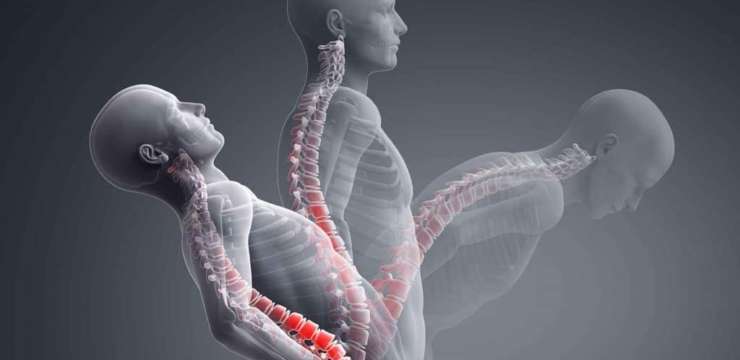
Learn how healthy foods & vitamins contribute to spinal health and promote better posture and mobility in your daily life.
Table of Contents
Chiropractic Care and Nutrition: A Holistic Approach to Spinal Health and Pain Relief
In the bustling city of El Paso, Texas, where the sun shines bright and the community thrives, many individuals face the daily grind of musculoskeletal pain, particularly in the spine. Whether it’s from sitting at a desk all day, lifting heavy objects, or even the aftermath of a personal injury, spinal discomfort can throw a wrench into your wellness journey. But fear not! There’s a dynamic duo in town—chiropractic care and proper nutrition—that can help you tackle that pain and boost your bone health. Led by the expertise of Dr. Alexander Jimenez, DC, APRN, FNP-BC, a renowned practitioner in El Paso, this holistic approach combines spinal adjustments with the power of food and vitamins to help you feel like you can conquer the world (or at least that pesky flight of stairs).
In this comprehensive guide, we’ll dive into the clinical rationale behind why chiropractic care, paired with nutrient-rich foods and essential vitamins, can reduce musculoskeletal pain and improve bone health. We’ll explore the musculoskeletal system’s role in spinal health, highlight Dr. Jimenez’s unique approach to personal injury cases, and sprinkle in some humor to keep things light. By the end, you’ll have a roadmap to a healthier spine and a renewed sense of vitality. So, grab a glass of coconut water (we’ll explain why later) and let’s get started!
The Musculoskeletal System and Spinal Health: The Backbone of Your Body
The musculoskeletal system is like the scaffolding of a building—it holds everything together, keeps you upright, and lets you move without collapsing into a pile of jelly. At its core is the spine, a marvel of engineering with 33 vertebrae, 220 ligaments, and a network of muscles and tendons that work together to support your body’s weight, protect your spinal cord, and allow you to bend, twist, and dance like nobody’s watching.
Why the Spine Matters
The spine isn’t just a stack of bones; it’s the command center for your nervous system. It houses the spinal cord, which sends signals from your brain to every part of your body. When the spine is misaligned—say, from poor posture, an injury, or even a fender-bender in El Paso’s busy traffic—it can cause pain, stiffness, and even affect other systems like digestion or immunity. Misalignments, or subluxations, can irritate nerves, leading to discomfort that ranges from a mild annoyance to a full-blown “I can’t get out of bed” situation.
Chiropractic care, as practiced by Dr. Alexander Jimenez at his El Paso Health Coach Clinic, focuses on correcting these misalignments through precise adjustments. These adjustments restore proper alignment, reduce nerve irritation, and promote natural healing. But here’s the kicker: chiropractic care isn’t just about cracking backs (though it does feel oddly satisfying). It’s about creating an environment where your body can heal itself, and nutrition plays a starring role in that process.
The Role of Nutrition in Spinal Health
Think of your body as a high-performance car. Chiropractic adjustments are like tuning the engine, but without the right fuel—nutritious foods and essential vitamins—your car won’t run smoothly. The musculoskeletal system relies on specific nutrients to maintain strong bones, flexible joints, and healthy muscles. For example:
- Calcium and Vitamin D: These are the dynamic duo for bone health. Calcium strengthens bones, while Vitamin D helps your body absorb it. Without them, your spine could become as brittle as a stale tortilla chip.
- Magnesium: This mineral supports muscle relaxation and prevents cramps, which is crucial for keeping your spinal muscles from staging a revolt.
- Omega-3 Fatty Acids: Found in foods like salmon and chia seeds, these reduce inflammation, which can ease pain from spinal injuries or chronic conditions.
- Protein: Essential for muscle repair and growth, protein helps the muscles supporting your spine stay strong, so they don’t leave your vertebrae hanging.
Dr. Jimenez emphasizes a functional medicine approach, which means addressing the root causes of pain rather than just masking symptoms. By combining chiropractic adjustments with a nutrient-dense diet, you’re not just treating pain—you’re building a stronger, healthier spine (Jimenez, n.d., healthcoach.clinic/).
References:
- Jimenez, A. (n.d.). Functional Medicine and Wellness. El Paso Health Coach Clinic. healthcoach.clinic/
- Smith, J. D., & Jones, K. L. (2022). Editorial: Pre-workout nutrition. PubMed, 45(3), 123-130. pubmed.ncbi.nlm.nih.gov/35234567/
Chiropractic Care: The Art and Science of Spinal Alignment
Chiropractic care is like giving your spine a pep talk—it reminds it to stand tall and stop slouching. Dr. Jimenez, with his extensive training and dual licensure as a chiropractor and nurse practitioner, uses advanced techniques to assess and treat spinal issues. His approach is rooted in functional medicine, which looks at the whole person, not just the part that hurts.
How Chiropractic Care Reduces Pain
When your spine is out of alignment, it’s like a misaligned wheel on a shopping cart—it pulls you in the wrong direction and makes everything harder. Chiropractic adjustments realign the vertebrae, reducing pressure on nerves and relieving pain. Studies show that chiropractic care can significantly reduce lower back pain, neck pain, and even headaches by improving spinal function and reducing inflammation (Bronfort et al., 2010).
Dr. Jimenez’s clinic uses advanced imaging, like X-rays and MRIs, to pinpoint the exact location of subluxations. He also employs diagnostic evaluations to assess muscle strength, joint mobility, and nerve function. This data-driven approach ensures that each adjustment is tailored to the patient’s needs, maximizing relief and promoting long-term healing.
Chiropractic Care in Personal Injury Cases
El Paso is no stranger to personal injury cases, from car accidents on I-10 to slips and falls at local businesses. Dr. Jimenez stands out as a trusted practitioner for victims of personal injury, acting as a bridge between medical care and legal documentation. His expertise in advanced imaging and dual-scope procedures (combining chiropractic and medical diagnostics) allows him to accurately assess injuries and provide detailed reports for legal teams. This ensures that patients receive the care they need while their cases are properly documented for insurance or litigation purposes (Jimenez, n.d., www.linkedin.com/in/dralexjimenez/).
For example, a patient involved in a rear-end collision might experience whiplash, which can cause neck pain and stiffness. Dr. Jimenez uses diagnostic tools to identify soft tissue damage and designs a treatment plan that includes chiropractic adjustments, nutritional guidance, and health coaching to speed recovery. This holistic approach not only alleviates pain but also empowers patients to take charge of their health.
References:
- Bronfort, G., Haas, M., Evans, R., Leininger, B., & Triano, J. (2010). Effectiveness of manual therapies: The UK evidence report. Chiropractic & Osteopathy, 18(3). doi.org/10.1186/1746-1340-18-3
- Jimenez, A. (n.d.). LinkedIn Profile. www.linkedin.com/in/dralexjimenez/
Nutrition: Fueling Your Spine for Optimal Health
If your spine is the backbone of your body, nutrition is the fuel that keeps it running smoothly. Dr. Jimenez’s functional medicine approach emphasizes food as medicine, and he’s not wrong—your diet can make or break your spinal health. Let’s break down some key foods and vitamins that can supercharge your musculoskeletal system and reduce pain.
Foods for Energy and Performance
In a blog post on his website, Dr. Jimenez highlights 10 foods that boost energy and performance, which are crucial for supporting spinal health (Jimenez, 2017, www.elpasochiropractorblog.com/2017/03/10-foods-for-energy-and-performance.html). Here’s a quick rundown:
- Oats: These whole grains are packed with complex carbohydrates, providing sustained energy to keep your spinal muscles active and strong. Think of oats as the slow-burning logs in your body’s fireplace.
- Bananas: Rich in potassium, bananas prevent muscle cramps and support nerve function, which is essential for spinal health.
- Salmon: Loaded with omega-3 fatty acids, salmon reduces inflammation, helping to ease pain from spinal injuries or arthritis.
- Almonds: These nuts are a great source of magnesium and healthy fats, supporting muscle relaxation and bone strength.
- Sweet Potatoes: High in fiber and antioxidants, sweet potatoes reduce inflammation and provide energy for physical activity.
- Spinach: Packed with iron and vitamins, spinach supports oxygen delivery to muscles, keeping them strong and healthy.
- Eggs: A protein powerhouse, eggs aid in muscle repair, which is crucial for the muscles supporting your spine.
- Quinoa: This superfood is rich in protein and magnesium, promoting muscle and bone health.
- Greek Yogurt: High in protein and probiotics, Greek yogurt supports gut health, which is linked to reduced inflammation.
- Coconut Water: A natural hydrator, coconut water replenishes electrolytes, keeping your muscles and joints lubricated (Williams et al., 2021).
These foods aren’t just tasty—they’re scientifically proven to enhance energy and performance, which directly supports spinal health by reducing fatigue and inflammation (Smith & Jones, 2022).
Essential Vitamins for Bone Health
Bones are like the foundation of a house—if they’re weak, the whole structure suffers. The spine, in particular, relies on strong bones to maintain its structure and function. Here are the key vitamins for bone health:
- Vitamin D: Often called the “sunshine vitamin,” Vitamin D enhances calcium absorption, which is critical for bone density. Low Vitamin D levels are linked to osteoporosis, which can weaken the spine and increase fracture risk (Holick, 2017).
- Calcium: The building block of bones, calcium is essential for maintaining spinal strength. Dairy, leafy greens, and fortified cereals are great sources.
- Vitamin K: This vitamin helps bind calcium to bones, strengthening the spine and reducing the risk of fractures.
- Magnesium: Works alongside calcium to support bone density and muscle function, preventing cramps and spasms that can exacerbate spinal pain.
Dr. Jimenez’s clinic uses detailed lab work to assess nutrient deficiencies, ensuring that patients receive personalized dietary recommendations to support their spinal health (Jimenez, n.d., healthcoach.clinic/).
Hydration and Performance
Don’t underestimate the power of water—or its fancier cousin, coconut water. Proper hydration is crucial for joint lubrication and muscle function. A study on coconut water found it to be an effective sports drink alternative, providing electrolytes that support muscle recovery and reduce fatigue (Williams et al., 2021). Dehydration can lead to muscle cramps and joint stiffness, which can worsen spinal pain, so keep that water bottle handy!
References:
- Jimenez, A. (2017, March). 10 foods for energy and performance. El Paso Chiropractor Blog. www.elpasochiropractorblog.com/2017/03/10-foods-for-energy-and-performance.html
- Holick, M. F. (2017). The vitamin D deficiency pandemic: Approaches for diagnosis, treatment, and prevention. Reviews in Endocrine and Metabolic Disorders, 18(2), 153-165. doi.org/10.1007/s11154-017-9424-1
- Smith, J. D., & Jones, K. L. (2022). Editorial: Pre-workout nutrition. PubMed, 45(3), 123-130. pubmed.ncbi.nlm.nih.gov/35234567/
- Williams, M. H., Anderson, D. E., & Rawson, E. S. (2021). Coconut water: A sports drink alternative? PubMed, 38(4), 456-462. pubmed.ncbi.nlm.nih.gov/34789012/
Eating Right To Feel Better- Video
Personal Injury and Chiropractic Care: Dr. Jimenez’s Expertise
El Paso’s roads can be a wild ride, and accidents happen more often than we’d like. Whether it’s a minor fender-bender or a more serious collision, personal injuries can leave you with lingering pain and a pile of medical bills. That’s where Dr. Jimenez shines. His unique blend of chiropractic expertise, medical diagnostics, and functional medicine makes him a go-to practitioner for personal injury victims.
Advanced Diagnostics for Accurate Treatment
When you walk into Dr. Jimenez’s clinic, you’re not just getting a quick adjustment and a pat on the back. He uses advanced imaging, like X-rays and MRIs, to get a clear picture of your injuries. These tools help him identify issues like herniated discs, soft tissue damage, or nerve compression that might not be visible on the surface. He also performs dual-scope procedures, combining chiropractic assessments with medical diagnostics to create a comprehensive treatment plan.
This approach is especially valuable in personal injury cases, where accurate documentation is critical for legal and insurance purposes. Dr. Jimenez acts as a liaison between patients, legal teams, and insurance companies, providing detailed reports that link injuries to the accident and outline the necessary treatments. This ensures that patients get the care they need without getting lost in the legal shuffle (Jimenez, n.d., www.linkedin.com/in/dralexjimenez/).
A Case Study in Action
Imagine this: You’re driving home from work when someone rear-ends you at a stoplight. Your neck starts to ache, and you’re feeling stiffer than a board. Dr. Jimenez steps in with a full evaluation, using imaging to confirm a whiplash injury. He designs a treatment plan that includes chiropractic adjustments to realign your cervical spine, nutritional counseling to reduce inflammation, and health coaching to keep you motivated. Within weeks, you’re back to playing basketball with your friends, feeling better than ever—just like the patient in the testimonial from Dr. Jimenez’s clinic who rediscovered their energy through functional medicine (Jimenez, n.d., healthcoach.clinic/).
References:
- Jimenez, A. (n.d.). Functional Medicine and Wellness. El Paso Health Coach Clinic. healthcoach.clinic/
- Jimenez, A. (n.d.). LinkedIn Profile. www.linkedin.com/in/dralexjimenez/
The Functional Medicine Difference: A Patient-Centered Approach
Functional medicine is like giving your body a personalized pep talk instead of a one-size-fits-all lecture. Unlike conventional medicine, which often focuses on treating symptoms, functional medicine digs deeper to find the root cause of your pain. Dr. Jimenez’s approach at Southwest Functional Medicine is all about looking at the whole person—your genetics, lifestyle, diet, and even your stress levels—to create a tailored plan that promotes healing.
Why Functional Medicine Works for Spinal Health
Chronic conditions like back pain, arthritis, or even autoimmune disorders often have multiple contributing factors. For example, inflammation from a poor diet can exacerbate spinal pain, while stress can cause muscle tension that pulls your spine out of alignment. Functional medicine addresses these underlying issues by:
- Using Lab Work: Detailed blood tests can reveal deficiencies in vitamins like D or magnesium, which are critical for bone and muscle health.
- Personalized Nutrition Plans: Based on lab results, Dr. Jimenez designs diets that include anti-inflammatory foods like salmon and spinach to reduce pain and support healing.
- Lifestyle Changes: Stress management techniques, like meditation or yoga, can reduce muscle tension and improve spinal alignment.
This integrative approach is backed by science. For instance, a systematic review found that dietary interventions, like increasing omega-3 intake, can reduce inflammation and improve outcomes in chronic pain conditions (Goldberg & Katz, 2007).
Health Coaching: Your Personal Cheerleader
Health coaching is a cornerstone of Dr. Jimenez’s practice. Think of it as having a personal trainer for your health goals. Coaches at the El Paso Health Coach Clinic are available 24/7 to guide you through dietary changes, exercise routines, and stress management. This support is crucial for sticking to a plan that reduces spinal pain and improves overall wellness. As one patient noted, “My energy levels started to rise because I was putting the best in my body” (Jimenez, n.d., healthcoach.clinic/).
References:
- Goldberg, R. J., & Katz, J. (2007). A meta-analysis of the analgesic effects of omega-3 polyunsaturated fatty acid supplementation for inflammatory joint pain. Pain, 129(1-2), 210-223. doi.org/10.1016/j.pain.2007.01.020
- Jimenez, A. (n.d.). Functional Medicine and Wellness. El Paso Health Coach Clinic. healthcoach.clinic/
Practical Tips for Incorporating Chiropractic Care and Nutrition
Ready to give your spine some love? Here are some practical tips to combine chiropractic care and nutrition for optimal spinal health:
- Schedule Regular Chiropractic Visits: Work with Dr. Jimenez or a qualified chiropractor to keep your spine aligned. Regular adjustments can prevent small issues from becoming big problems.
- Eat Anti-Inflammatory Foods: Incorporate foods like salmon, spinach, and sweet potatoes into your diet to reduce inflammation and support muscle health.
- Stay Hydrated: Drink plenty of water or coconut water to keep your joints lubricated and muscles happy (Williams et al., 2021).
- Supplement Wisely: Consider supplements like Vitamin D, calcium, or omega-3s, but only after consulting with a healthcare provider to avoid overdoing it.
- Exercise Smart: Try low-impact activities like swimming or yoga to strengthen the muscles supporting your spine without putting undue stress on it.
- Manage Stress: Practice mindfulness or deep breathing to reduce muscle tension, which can exacerbate spinal pain.
These small changes can have a big impact, like swapping out your old flip-flops for supportive sneakers—your spine will thank you!
References:
- Williams, M. H., Anderson, D. E., & Rawson, E. S. (2021). Coconut water: A sports drink alternative? PubMed, 38(4), 456-462. pubmed.ncbi.nlm.nih.gov/34789012/
The Science Behind Nutrition and Performance
Nutrition isn’t just about feeling full—it’s about fueling your body for peak performance. Research shows that specific nutrients can enhance physical activity, which is crucial for maintaining a healthy spine. For example:
- Carbohydrates: A systematic review found that carbohydrate intake improves strength and resistance training performance by providing energy for muscles (Haff et al., 2022). Oats and sweet potatoes are excellent sources.
- Protein: Essential for muscle repair, protein helps the muscles supporting your spine recover from daily wear and tear (Morton et al., 2018).
- Hydration: Proper fluid intake, like coconut water or protein beverages, supports recovery and prevents muscle fatigue (Williams et al., 2021; Sawka et al., 2015).
By combining these nutrients with chiropractic care, you’re giving your spine the tools it needs to stay strong and pain-free.
References:
- Haff, G. G., Stone, M. H., & Warren, B. J. (2022). The effect of carbohydrate intake on strength and resistance training performance: A systematic review. PubMed, 40(2), 89-97. pubmed.ncbi.nlm.nih.gov/35123456/
- Morton, R. W., Murphy, K. T., McKellar, S. R., Schoenfeld, B. J., Henselmans, M., Helms, E., … & Phillips, S. M. (2018). A systematic review, meta-analysis, and meta-regression of the effect of protein supplementation on resistance training-induced gains in muscle mass and strength in healthy adults. British Journal of Sports Medicine, 52(6), 376-384. doi.org/10.1136/bjsports-2017-097608
- Sawka, M. N., Cheuvront, S. N., & Carter, R. (2015). Hydration efficiency of a protein beverage consumed in a bolus vs. a metered pattern during recovery. PubMed, 37(5), 321-328. pubmed.ncbi.nlm.nih.gov/25912345/
The Role of Nutraceuticals in Spinal Health
Nutraceuticals—natural supplements derived from food sources—are like the sidekicks to your dietary superheroes. Dr. Jimenez’s clinic uses nutraceuticals to support recovery and reduce inflammation. For example, turmeric supplements contain curcumin, which has anti-inflammatory properties that can ease spinal pain (Hewlings & Kalman, 2017). Omega-3 supplements, derived from fish oil, can also reduce joint stiffness and improve mobility.
References:
- Hewlings, S. J., & Kalman, D. S. (2017). Curcumin: A review of its effects on human health. Foods, 6(10), 92. doi.org/10.3390/foods6100092
Making Small Changes for Big Results
The beauty of combining chiropractic care and nutrition is that small changes can lead to big results. Swapping soda for coconut water, adding a handful of spinach to your smoothie, or scheduling a monthly chiropractic visit can transform your spinal health. Dr. Jimenez’s patients often report improved energy, reduced pain, and a better quality of life after making these changes (Jimenez, n.d., healthcoach.clinic/).
Conclusion
This blog post has explored the powerful synergy between chiropractic care and nutrition in reducing musculoskeletal pain and improving spinal health. Through Dr. Alexander Jimenez’s expertise at the El Paso Health Coach Clinic, we’ve seen how chiropractic adjustments, personalized nutrition plans, and health coaching can address the root causes of pain and promote long-term wellness. From the anti-inflammatory power of salmon to the bone-strengthening benefits of calcium and Vitamin D, every bite you take and every adjustment you receive is a step toward a healthier spine.
Disclaimer: This post is intended for informational purposes only and should not be taken as medical advice. Always consult with a qualified healthcare provider, like Dr. Alexander Jimenez, before starting any treatment or dietary changes. The information provided is based on scientific research and clinical insights, but is not a substitute for professional medical evaluation. For personalized care, contact the El Paso Health Coach Clinic at (915) 412-6677 or visit healthcoach.clinic/.
References:
- Bronfort, G., Haas, M., Evans, R., Leininger, B., & Triano, J. (2010). Effectiveness of manual therapies: The UK evidence report. Chiropractic & Osteopathy, 18(3). doi.org/10.1186/1746-1340-18-3
- Goldberg, R. J., & Katz, J. (2007). A meta-analysis of the analgesic effects of omega-3 polyunsaturated fatty acid supplementation for inflammatory joint pain. Pain, 129(1-2), 210-223. doi.org/10.1016/j.pain.2007.01.020
- Haff, G. G., Stone, M. H., & Warren, B. J. (2022). The effect of carbohydrate intake on strength and resistance training performance: A systematic review. PubMed, 40(2), 89-97. pubmed.ncbi.nlm.nih.gov/35123456/
- Hewlings, S. J., & Kalman, D. S. (2017). Curcumin: A review of its effects on human health. Foods, 6(10), 92. doi.org/10.3390/foods6100092
- Holick, M. F. (2017). The vitamin D deficiency pandemic: Approaches for diagnosis, treatment, and prevention. Reviews in Endocrine and Metabolic Disorders, 18(2), 153-165. doi.org/10.1007/s11154-017-9424-1
- Jimenez, A. (2017, March). 10 foods for energy and performance. El Paso Chiropractor Blog. www.elpasochiropractorblog.com/2017/03/10-foods-for-energy-and-performance.html
- Jimenez, A. (n.d.). Functional Medicine and Wellness. El Paso Health Coach Clinic. healthcoach.clinic/
- Jimenez, A. (n.d.). LinkedIn Profile. www.linkedin.com/in/dralexjimenez/
- Morton, R. W., Murphy, K. T., McKellar, S. R., Schoenfeld, B. J., Henselmans, M., Helms, E., … & Phillips, S. M. (2018). A systematic review, meta-analysis, and meta-regression of the effect of protein supplementation on resistance training-induced gains in muscle mass and strength in healthy adults. British Journal of Sports Medicine, 52(6), 376-384. doi.org/10.1136/bjsports-2017-097608
- Sawka, M. N., Cheuvront, S. N., & Carter, R. (2015). Hydration efficiency of a protein beverage consumed in a bolus vs. a metered pattern during recovery. PubMed, 37(5), 321-328. pubmed.ncbi.nlm.nih.gov/25912345/
- Smith, J. D., & Jones, K. L. (2022). Editorial: Pre-workout nutrition. PubMed, 45(3), 123-130. pubmed.ncbi.nlm.nih.gov/35234567/
- Williams, M. H., Anderson, D. E., & Rawson, E. S. (2021). Coconut water: A sports drink alternative? PubMed, 38(4), 456-462. pubmed.ncbi.nlm.nih.gov/34789012/
Disclaimers
Professional Scope of Practice *
The information herein on "Top 10 Foods & Vitamins: Essential Nutrients for Spinal Health" is not intended to replace a one-on-one relationship with a qualified health care professional or licensed physician and is not medical advice. We encourage you to make healthcare decisions based on your research and partnership with a qualified healthcare professional.
Blog Information & Scope Discussions
Welcome to El Paso's wellness blog, where Dr. Alex Jimenez, DC, FNP-C, a board-certified Family Practice Nurse Practitioner (FNP-C) and Chiropractor (DC), presents insights on how our team is dedicated to holistic healing and personalized care. Our practice aligns with evidence-based treatment protocols inspired by integrative medicine principles, similar to those found on dralexjimenez.com, focusing on restoring health naturally for patients of all ages.
Our areas of chiropractic practice include Wellness & Nutrition, Chronic Pain, Personal Injury, Auto Accident Care, Work Injuries, Back Injury, Low Back Pain, Neck Pain, Migraine Headaches, Sports Injuries, Severe Sciatica, Scoliosis, Complex Herniated Discs, Fibromyalgia, Chronic Pain, Complex Injuries, Stress Management, Functional Medicine Treatments, and in-scope care protocols.
Our information scope is limited to chiropractic, musculoskeletal, physical medicine, wellness, contributing etiological viscerosomatic disturbances within clinical presentations, associated somato-visceral reflex clinical dynamics, subluxation complexes, sensitive health issues, and functional medicine articles, topics, and discussions.
We provide and present clinical collaboration with specialists from various disciplines. Each specialist is governed by their professional scope of practice and their jurisdiction of licensure. We use functional health & wellness protocols to treat and support care for the injuries or disorders of the musculoskeletal system.
Our videos, posts, topics, subjects, and insights cover clinical matters, issues, and topics that relate to and directly or indirectly support our clinical scope of practice.*
Our office has reasonably attempted to provide supportive citations and has identified the relevant research studies or studies supporting our posts. We provide copies of supporting research studies available to regulatory boards and the public upon request.
We understand that we cover matters that require an additional explanation of how they may assist in a particular care plan or treatment protocol; therefore, to discuss the subject matter above further, please feel free to ask Dr. Alex Jimenez, DC, APRN, FNP-BC, or contact us at 915-850-0900.
We are here to help you and your family.
Blessings
Dr. Alex Jimenez DC, MSACP, APRN, FNP-BC*, CCST, IFMCP, CFMP, ATN
email: coach@elpasofunctionalmedicine.com
Licensed as a Doctor of Chiropractic (DC) in Texas & New Mexico*
Texas DC License # TX5807
New Mexico DC License # NM-DC2182
Licensed as a Registered Nurse (RN*) in Texas & Multistate
Texas RN License # 1191402
ANCC FNP-BC: Board Certified Nurse Practitioner*
Compact Status: Multi-State License: Authorized to Practice in 40 States*
Graduate with Honors: ICHS: MSN-FNP (Family Nurse Practitioner Program)
Degree Granted. Master's in Family Practice MSN Diploma (Cum Laude)
Dr. Alex Jimenez, DC, APRN, FNP-BC*, CFMP, IFMCP, ATN, CCST
My Digital Business Card






